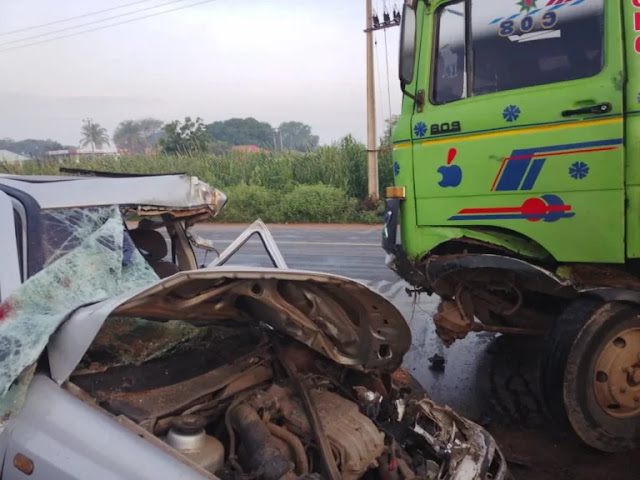In a significant breakthrough in its ongoing battle against drug trafficking, the National Drug Law Enforcement Agency (NDLEA) in Kano State, Nigeria, intercepted 112 kilograms of cannabis sativa, commonly known as marijuana, following a road accident on the Kano-Zaria highway. The incident, which occurred in the early hours of September 2025, involved a commercial bus that overturned, revealing a concealed stash of illicit drugs hidden within its cargo. The NDLEA’s swift response to the crash not only led to the seizure of the contraband but also underscored the agency’s vigilance in curbing the flow of illegal substances across Nigeria’s northern region, a critical hub for both domestic and transborder drug trafficking.
The interception comes at a time when Nigeria grapples with rising drug-related crimes, fueled by the country’s strategic location as a transit point for narcotics moving from West Africa to global markets. The NDLEA, under the leadership of Brigadier General Mohamed Buba Marwa (rtd), has intensified its operations nationwide, leveraging intelligence, community partnerships, and inter-agency collaboration to disrupt drug cartels. The Kano incident, reported by Nigerian News Direct, highlights the agency’s proactive approach and raises broader questions about road safety, smuggling tactics, and the socio-economic drivers of the drug trade in Nigeria.
Details of the Incident and NDLEA’s Response
The incident unfolded on the busy Kano-Zaria highway, a major artery connecting Nigeria’s northern commercial hub of Kano to other regions. According to the NDLEA’s Kano State Command, operatives received a distress call about a road accident involving a Toyota HiAce bus at approximately 2:30 a.m. The bus, en route from Kaduna to Kano, had veered off the road near the Gadar Tamburawa area, overturning into a ditch. Emergency responders, including the Federal Road Safety Corps (FRSC), were already at the scene when NDLEA officers arrived, prompted by a tip-off about suspicious cargo.
Upon inspection, NDLEA operatives discovered 112 kilograms of cannabis sativa concealed in large sacks among legitimate goods like foodstuffs and household items. The drugs were meticulously packed to evade detection, a common tactic employed by traffickers to exploit the high volume of commercial transport in the region. The bus driver, identified as 38-year-old Musa Abdullahi, and a passenger suspected to be an accomplice were apprehended at the scene. Preliminary investigations suggest the cannabis originated from a neighboring state, possibly Bauchi or Plateau, with Kano serving as a distribution hub for onward movement to other parts of Nigeria or across borders into Niger or Chad.
The NDLEA’s Kano State Commander, Abubakar Idris Ahmad, addressed the media shortly after the seizure, describing it as a testament to the agency’s round-the-clock vigilance. “This interception was not a mere coincidence. Our operatives are trained to act on intelligence and respond swiftly to any situation that could lead to uncovering illicit activities,” he stated. He noted that the road crash inadvertently aided the operation, as the overturned vehicle exposed the hidden cargo, which might have otherwise gone undetected at routine checkpoints. The seized cannabis, valued at approximately ₦5.6 million on the black market, was transported to the NDLEA’s state headquarters for further analysis and documentation.
Context of Drug Trafficking in Kano and Northern Nigeria
Kano State, with its sprawling markets, dense population, and proximity to Nigeria’s northern borders, has long been a focal point for drug trafficking. The city’s Sabon Gari and Kwanar Sabo markets are notorious for underground dealings in cannabis, tramadol, codeine, and other substances. The Kano-Zaria highway, stretching over 130 kilometers, is a critical route for both legitimate trade and illicit activities, connecting Nigeria’s northern interior to southern ports and international borders. Traffickers exploit the high traffic of commercial vehicles, blending drugs with legal goods to avoid suspicion.
The NDLEA has identified northern Nigeria as a hotspot for cannabis cultivation, particularly in states like Ondo, Edo, and Delta, from where the drug is transported northward. Kano’s role as a distribution hub is amplified by its porous borders with Niger, Chad, and Cameroon, making it a conduit for cross-border smuggling. The agency’s 2024 annual report noted a 30% increase in cannabis seizures in the north compared to 2023, reflecting both the growing scale of the trade and improved enforcement efforts. Beyond cannabis, the region faces challenges with synthetic drugs and prescription opioids, which have fueled addiction crises among youths.
The road crash interception highlights a recurring issue: traffickers’ use of unconventional methods to evade detection. Concealing drugs in vehicles carrying perishable goods or household items is a tactic designed to exploit the logistical challenges of inspecting every consignment on Nigeria’s highways. The NDLEA has responded by deploying mobile scanners and sniffer dogs at key checkpoints, but the vastness of routes like Kano-Zaria stretches resources thin. The agency’s reliance on intelligence and community tips, as demonstrated in this case, has proven effective but underscores the need for sustained investment in technology and personnel.
Broader Implications for Road Safety and Drug Enforcement
The Kano incident also brings road safety into focus. The FRSC’s preliminary report on the crash cited overloading and driver fatigue as possible causes, common issues on Nigeria’s highways. The bus, designed to carry 18 passengers, was carrying 25, with additional cargo that likely included the 112 kilograms of cannabis. This overloading may have contributed to the vehicle’s instability, leading to the crash. The FRSC has since called for stricter enforcement of vehicle weight limits and mandatory rest periods for long-haul drivers.
From an enforcement perspective, the incident reinforces the NDLEA’s multi-pronged strategy. Under Marwa’s leadership since 2021, the agency has adopted a zero-tolerance policy, combining aggressive raids, arrests, and prosecutions with preventive measures like public awareness campaigns. In Kano alone, the NDLEA reported over 1,200 arrests and 3.5 tons of drug seizures in 2024, with cannabis accounting for 60% of the haul. The agency’s collaboration with the Nigeria Police, Customs Service, and local vigilante groups has enhanced its operational reach, particularly in high-risk areas like Gaya and Kura.
The interception also highlights the socio-economic drivers of drug trafficking. Many couriers, like the apprehended driver, are often low-income individuals lured by quick profits. Unemployment, which stands at 33% nationally as of 2025, and poverty levels exceeding 40% in northern Nigeria create fertile ground for cartels to recruit vulnerable individuals. The NDLEA’s response includes rehabilitation programs, with over 500 drug users in Kano enrolled in counseling and vocational training in 2024. However, scaling these efforts requires federal and state funding, which remains a challenge amid competing budgetary priorities.
Investigation and Legal Proceedings
Following the seizure, the NDLEA launched a comprehensive investigation to trace the drug’s supply chain. The arrested suspects, Musa Abdullahi and his alleged accomplice, are undergoing interrogation to identify the source, intended recipients, and any syndicate involved. Preliminary findings suggest the cannabis was destined for local dealers in Kano’s urban slums, with potential onward distribution to neighboring countries. The agency is leveraging forensic analysis to match the seized cannabis with known cultivation sites, a process aided by its newly established drug profiling laboratory in Lagos.
Under Nigeria’s NDLEA Act, trafficking cannabis carries a penalty of up to seven years imprisonment, with harsher sentences for repeat offenders or syndicate leaders. The agency has vowed to prosecute the suspects swiftly, sending a deterrent message. However, legal challenges persist, including delays in court proceedings and allegations of corruption within the judicial system. The NDLEA has called for specialized drug courts to expedite cases, a proposal under review by the National Assembly.
Community and Stakeholder Reactions
The interception has elicited varied responses. Community leaders in Kano, including the Emir of Kano, Alhaji Aminu Ado Bayero, commended the NDLEA’s vigilance, urging residents to report suspicious activities. Local traders, however, expressed concerns about increased scrutiny of legitimate goods, which could delay commerce. The Kano State Government, led by Governor Abba Kabir Yusuf, pledged support for NDLEA operations, including funding for additional patrol vehicles.
Civil society organizations, such as the Drug-Free Nigeria Initiative, praised the seizure but called for broader interventions, including youth empowerment programs to reduce demand. Social media reactions, particularly on platforms like X, reflected public frustration with the drug trade’s persistence, with hashtags like #StopDrugTrafficking trending in northern Nigeria. Critics, however, pointed to the need for addressing root causes like poverty and weak border controls.
NDLEA’s Broader Anti-Drug Strategy
The Kano interception is part of the NDLEA’s nationwide campaign, dubbed “Operation Clean Sweep,” launched in 2023 to dismantle drug networks. The agency has intensified raids on cultivation sites, with over 1,000 hectares of cannabis farms destroyed in 2024. Partnerships with international bodies like the United Nations Office on Drugs and Crime (UNODC) have enhanced intelligence-sharing, particularly for tracking transborder shipments. The NDLEA’s “War Against Drug Abuse” (WADA) campaign, targeting schools and religious institutions, has reached over 10 million Nigerians, emphasizing prevention.
In Kano, the agency plans to establish two additional rehabilitation centers by 2026, complementing the existing facility in Dala LGA. These centers aim to reintegrate former users into society through skills training and psychological support. The NDLEA also collaborates with the National Orientation Agency (NOA) to sensitize communities, particularly in high-risk areas like Fagge and Gwale.
Challenges and Future Outlook
Despite its successes, the NDLEA faces challenges. Limited funding hampers its ability to deploy advanced technology, such as drones for border surveillance. Corruption within law enforcement agencies occasionally undermines operations, with reports of compromised checkpoints. Public distrust, fueled by past allegations of extortion, requires ongoing community engagement to rebuild confidence.
Looking ahead, the NDLEA aims to integrate artificial intelligence for predictive policing, identifying trafficking routes based on data patterns. The agency is also lobbying for stiffer penalties under a proposed amendment to the NDLEA Act, targeting syndicate leaders. In Kano, plans for a state-of-the-art command center will enhance coordination with other security agencies.
Conclusion: A Step Toward a Drug-Free Nigeria
The interception of 112 kilograms of cannabis in Kano is more than a single victory; it is a microcosm of Nigeria’s complex fight against drug trafficking. The NDLEA’s swift action, aided by a road crash, underscores the unpredictability of enforcement and the need for constant vigilance. As Nigeria navigates economic and security challenges in September 2025, the agency’s work in Kano sends a clear message: no route is safe for traffickers.
The incident also highlights broader issues—road safety, poverty, and regional connectivity—that demand holistic solutions. By combining enforcement with prevention and rehabilitation, the NDLEA is laying the groundwork for a sustainable approach. For Kano, a city of commerce and culture, and for Nigeria as a whole, this seizure is a step toward a future where communities are free from the scourge of drugs, and opportunities abound for all citizens to thrive.






